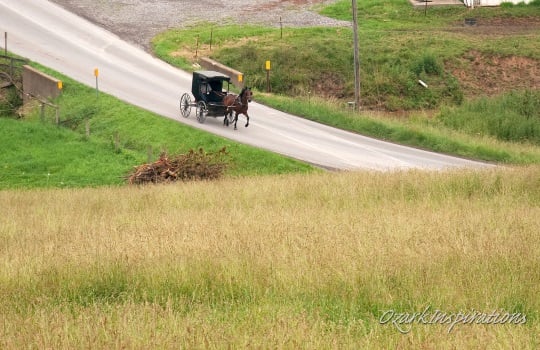A Visit To The Weavers: Candid Amish Thoughts on Technology, Family & More
This weekend the Guardian featured an extensive article on the Amish, under the heading “‘Our faith will be lost if we adopt technology’: can the Amish resist the modern world?”
Writer Ian Birrell visited a community in New York and spoke with several Amish and Amish-raised people. The main topic is the growth of the Amish and the threat posed by technology and modernity. It’s a familiar but important one. As is often the case, the Amish example raises questions for the rest of us as well.
The main family featured is the Daniel Weaver family, of Morris, New York, along with Daniel’s son Samuel. The Weavers happen to be friends. They are from a New Order Amish church. This goes some way to explaining their openness to participating in the article, and the photos that accompany it.
I also had a chance to visit the Weavers’ community a couple of weeks ago, my first time since they’d moved there. Unfortunately the post-snow mucky weather was nothing like what you’ll see in the summer photos shot for the article. It really looks like a different place!
It is a much, much smaller community than the one Daniel previously lived in, and that is part of the appeal.
Here are a few choice sections from the piece:
Daniel Weaver does not vote, drive a car, read a paper, listen to music, watch sport of any kind, own a mobile phone or use a computer. But as we eat the food grown in his garden outside the window, he confesses that he did once see a film. He refuses to disclose what, brushing aside my questions as we sit talking around the dining table with his wife, five of his eight children and one grandson. “I am not proud of that,” he says. “I went against my parents’ wishes.”
But this one-off incident, many years ago, speaks to the reasons why this 52-year-old sold his thriving Ohio clothing business, one that supplied hundreds of stores across North America, and moved his family to this idyllic farm in upstate New York three years ago. Daniel is Amish – a member of a community famed worldwide for their plain clothes and use of horse-drawn buggies – and he fears the impact of modernity and the temptations of technology on his children, his church and his traditional Christian world. “Our values are different and we chose to safeguard them,” he says. “But if our people get lax and rub elbows too much with the world, then the world may not look too different – we become like the people outside.”
Daniel is one of the most warm and hospitable people I know, but he is also very clear on where his values lie. This is what he tells Ian:
“I feel you can be trusted, so you are sitting at my table,” Daniel says. “But on a friendship level, our values are very different. We would not want to mix with you, because if our children came to your home, they might sit and watch television.”
“Would not want to mix with you” sounds blunt, but I think it’s pretty clear what Daniel means. I have also eaten meals at his home, attended his church on multiple occasions, and stayed the night at his family and community members’ homes. But there are still lines to respect and there is a difference between being Amish and being English, especially when it comes to influences on the children.
Daniel’s adult son Samuel:
Sam, who has travelled abroad, says he is old enough to remember a pre-digital era, before computers and smartphones. “I can see the big changes they have brought to society, which my children will never see. There is more independence on the individual level, but people have become more selfish – everything is for themselves. We value the idea of working for the betterment of everyone. Christ said we are to be a light to the world. We are not saying we want everyone to be Amish, or that we are better, but our goal in a selfish society is to show people that it works if we are honest in our dealings, respect people and go the extra mile.”
Sam’s thoughts point to the idea of being a good example. You might hear Amish people say something along the lines of “let your light shine, but don’t shine it in anyone’s face.” I didn’t ask Daniel when I visited, but I would guess this is one reason they were open to participating in this article. While Amish people are not evangelical in the sense of aggressively seeking converts, an article in a widely-read secular publication just might be a way to reach some hearts and minds they might otherwise never come into contact with.
Next, some thoughts from an Amish business owner. Ola has the largest business of any Amish person I know:
One of the biggest is a kitchen cabinet business started by Ola Yoder in his barn two decades ago. It now churns out 6,000 units a day from an industrial park in Indiana, employing 500 staff. Unusually, Yoder, now 72, spent seven years outside the Amish in his early 20s. “I saw how other people lived and decided it was not for me or my kids,” he says, although he still has many “English” friends. He also spent time working for a major company. “They had rules about drugs and swearing, but no one enforced them,” he says. “In corporate America, it is all about climbing up the ladder.”
Yoder bans mobile phones at work, asking why you would want to employ someone who is always texting, and says he sticks to Amish values in business. “Success is about finding peace within yourself and your family. For the Amish, money is just a tool to enable you to live your faith. What good would it do, to have smart cars and fly all over the world?”
I also got my two cents in:
“The smartphone is a threat to the Amish not only for the darker aspects of the internet, such as access to pornography, but also for the way it can change the way we behave,” says Erik Wesner, founder of the authoritative Amish America website. “We have all got quickly used to finding instant solutions online. These can erode traditional values that the Amish revere, such as patience and dependence upon their community. And unlike a car or pickup truck, a smartphone is easily hidden.”
Yet Wesner believes the Amish will adapt, with more conservative groups resisting the digital age for as long as possible, just as some still resist electricity and modern plumbing while the majority retain defining markers such as austere clothing and a ban on car ownership. “They do gradually change, although at slower pace.”
The article is well worth reading in full. It’s both an up-close visit with the Weaver family, and a non-candy-coated look at their strongly-held convictions. You can read it all here.






Good article. I remember how they told us computers would save paper and time. I have less time now, more paperwork and get less done now than I ever did. My husband and I longed for a simpler life in our 30s. But as technology grew we were drawn in, as were our children and instead our lives became more complex and less family focused. I pray the Amish are able to continue resisting the draw of our “progressive” society and remain strong in their values.
I think that’s not uncommon Debbie. In a vacuum the computer, smartphone, etc are useful tools but they can introduce complexity and major distractions. One minor thing I try to do is block all but the most necessary notifications on my smartphone. Constant pinging drives me up the wall after a while 🙂 Thanks for your thoughts.
Interesting article
Very good article! I was just with my Amish friends from Lancaster County this past weekend. I do believe that new technology may have an impact on some young Amish folks, I believe that many of the older Amish folks are so far behind and it would take many years for them to figure out how to use most new technology. I went out to dinner at the Bird-in-Hand restaurant with my Old Order Amish friend – normally, we go to Fisher’s Amish Restaurant, but that is permanently closed now. My friend – who is an older male in his early seventies, went behind the area where the restaurant workers were to get his food (I kindly let him know as didn’t want to embarrass him) and then when he went to pay, he went to the wrong area and once to the right area, I overheard the cashier explaining how he needs to sign the receipt, etc. (it was obvious that he didn’t really know how to check out using his debit card). I left there with the conclusion that if we go out again when I am there, that I will make it much easier for him and I will pay and bring him to a restaurant where he is more comfortable. I guess my point is that by the time most of them figure out how to use the “new” technology, it will likely be when the “new” technology is outdated and old. And though there are young Amish folks who have cell-phones and are able to adapt more, once they get baptized and no longer user the technology, they too will fall far behind technology-wise. I hope the Amish never change – they really are the most kind, beautiful people that I have ever met.
It is hard to imagine but will inevitably be true that there will be a time when the smartphones and other tech of today appear “quaint” to future generations, like rotary telephones and rabbit-ear-antenna TVs. One of the biggest examples I think the Amish offer non-Amish as regards tech is to be thoughtful about how we use it–even though most of use aren’t going to “go Amish” in our daily lives. Their example can at least make us stop to think about who is the master, us or the gadgets. Actually changing habits is another matter though.
A few thoughts
As I was reading the article, it was mentioned that to fully embrace technology would be a loss of faith. In that I was reminded about the strong intertwining of culture, lifestyle and faith that makes up the plain community. When aspects of one’s daily life and culture are so rooted in faith and belief to see one without the other would be a far stretch I would think. I see this even in my corner of the Brethren world.